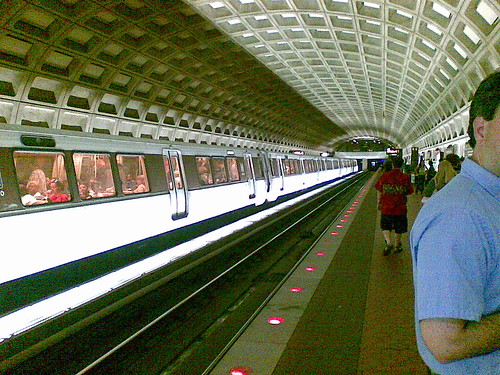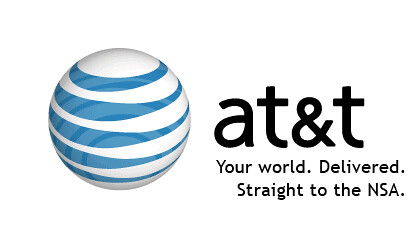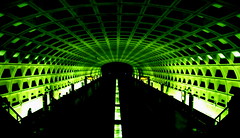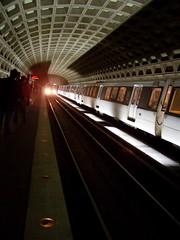(Source: Washington Examiner)
• Region encompasses Washington, DC; Northern Virginia; and Suburban Maryland — an area 6,000 square miles (15,500 square kilometres)
• The 4th largest population in the United States (6 million people); population expected to grow by 1/2 million by 2010
• Gross regional product (GRP) of $342 billion — 4th largest in the nation
• Led the United States in job growth over past 5 years — 270,000 jobs added from 2000 to 2005
• But still has a Metro system that does not allow for ubiquitous communications.
Metro riders will still hear silence on their phones even when Metro extends cell phone service in its underground rail system later this year.
 The transit agency plans to expand cell phone service to include more carriers in the 20 busiest rail stations by the fall — but it won’t extend into the adjacent subway tunnels yet. And it could remain a patchwork of service for up to three more years.
The transit agency plans to expand cell phone service to include more carriers in the 20 busiest rail stations by the fall — but it won’t extend into the adjacent subway tunnels yet. And it could remain a patchwork of service for up to three more years.
“We’re going to have a lot of very frustrated customers if they are going to be getting and losing signals going in and out of stations,” warned Peter Benjamin, a Metro board member who represents Maryland.
The problem stems partly from the requirement that forces the agency to add the service. In exchange for $1.5 billion in dedicated federal funding that Congress authorized last year, Metro is required to have cell phone service in the 20 busiest stations by October, then have it in all 47 underground stations by October 2010. Service throughout the entire system wouldn’t need to be finished until October 2012.
Metro’s board of directors agreed earlier in the spring to negotiate a $40 million contract with national carriers Sprint Nextel, AT&T, T-Mobile and Verizon Wireless to fulfill the requirement.
But Metro board members said Thursday they were worried that meeting the minimums of the federal timetable without going further would just anger and confuse riders.
“We don’t want to build in frustration,” said member Gordon Linton.
Note: TransportGooru wonders what would it take for the Metro management to fix this messy communication system. This nation holds many brilliant minsd and the city iteself plays home to several technology giants (Lockheed,BAE, etc). We, as a nation, have launched manned missions to moon and now working on getting to mars for the past few years. But we still can’t fix the communications system in an underground network of tunnels?
We know very well that we have the technology, we have the interest and above all we have the “need”. But still metro can’t find one person/company who can fix this system? What we lack is the political will and the sincereity to serve the customers for what they pay. If it is not a technical problem and one that solely involves money, pay some Harvard MBA to workout a business model that benefits everyone, not just the customers who own a Verizon or an AT&T phone. Bring people who can think outside the box and offer solutions that work.
TransportGooru would like to challenge the Metro Management to get this done in 100 days. If Guantanamo Prison(not fully done though) can be closed & $9.3 billions dollars can be spent creating thousands of jobs in 100 days of a President who had to contend with much larger problems, why can’t a damned communications systems in a metro rail system be fixed. Why do we need to wait for 3 more years? Doesn’t that tell you how inefficient you are, Mr. John Catoe & company. Fast track the process and get it done, dammit. Hire more workers to run the cables inside your tunnels & deploy required equipment. For the $8 customers pay through their nose everyday to ride your system, they deserve better than “We don’t want to build in frustration.” For one just do that very thing you don’t want to do. Who knows you may very well do it right! If your Board members don’t have the courage to act decisively and quickly, fire them all and appoint folks who know a thing or two about running a system and about relating to “customers’ needs”. Why do you always come up with an excuse for not doing anything on time – be it running a train or building a communication system? What more do you need, Metro? Customer service has never been an integral part of the DC Metro system. It seems to remain only as a lip service even in the years to come.







